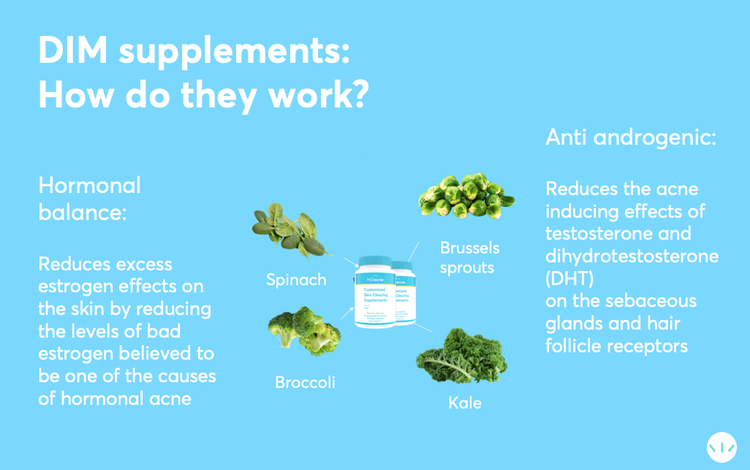Polycystic Ovary Syndrome (PCOS) and acne

Polycystic Ovary Syndrome (PCOS) and Acne: Causes, Treatments, and Prevention
Polycystic ovary syndrome (PCOS) is a hormonal disorder that can cause small ovarian cysts and enlarged ovaries. Beyond its effects on fertility, PCOS often leads to several hormone-related side effects, including acne and other skin issues.
What is Polycystic Ovary Syndrome (PCOS)?
PCOS symptoms typically begin after puberty and vary from person to person. Common symptoms include weight gain, mood swings, excessive facial or body hair (hirsutism), irregular periods, acne, and reduced fertility. Acne, in particular, is a frequent and often distressing symptom.
Women with PCOS have elevated androgen (testosterone) levels produced by the ovaries or adrenal glands. This hormonal imbalance drives many of the disorder's symptoms. A diagnosis often involves a physical exam and blood tests conducted by your OB-GYN.
How Does PCOS Cause Acne?
Excess androgens stimulate sebaceous (oil) glands in the skin, increasing sebum production. Combined with dead skin cells, this excess oil can clog pores, leading to blackheads, whiteheads, and inflammatory acne. Women with PCOS often experience more persistent and severe acne, particularly cystic acne, which typically appears along the jawline, neck, chest, and back. Unlike regular hormonal acne, which fluctuates with the menstrual cycle, PCOS-related acne tends to be more consistent.
Treating Acne Caused by PCOS
Effective treatments for PCOS-related acne often combine hormonal therapies, skincare routines, and dietary or lifestyle adjustments.
1. Hormonal Treatments
- Oral Contraceptives: Birth control pills are commonly prescribed to regulate periods and reduce testosterone levels. Pills containing cyproterone acetate or drospirenone are particularly effective, reducing acne by 30–60% within 3–6 months.
- Spironolactone: This androgen blocker decreases sebum production and reduces breakouts.
2. DIM Supplements
- Diindolylmethane (DIM), derived from cruciferous vegetables, helps metabolize and balance excess hormones. DIM Supplements, like MDacne’s Skin Clearing Supplements, target hormonal acne from within, reducing flare-ups and inflammation.
3. Anti-Inflammatory Diet
- Reducing inflammatory foods like red meat, refined sugars, and white bread while increasing anti-inflammatory options such as leafy greens, salmon, turmeric, and healthy oils can balance insulin levels and hormonal activity.
4. Oral Medications for Severe Cases
- Isotretinoin (Accutane): A powerful treatment for severe cystic acne.
- Zinc Supplements: Zinc aids hormone regulation and reduces sebum production while also supporting hair health and addressing PCOS symptoms like unwanted body hair or thinning scalp hair. MDacne’s vitamins + Minerals Supplements combine zinc with other acne-fighting nutrients like vitamins A and B5.

Preventing Acne Caused by PCOS
Prevention focuses on healthy habits and proper skincare routines.
1. Establish a Consistent Skincare Routine
Use a medicated cleanser, treatment cream, and moisturizer designed for acne-prone skin. Look for ingredients like salicylic acid, benzoyl peroxide, and niacinamide to cleanse, treat, and hydrate without clogging pores.
2. Incorporate Targeted Skincare Ingredients
- Salicylic Acid: Penetrates deeply to unclog pores, exfoliate dead skin, and reduce oiliness.
- Benzoyl Peroxide: Kills acne-causing bacteria, reduces inflammation, and prevents blockages.
3. Reduce Stress and Prioritize Sleep
- Stress increases cortisol levels, which can stimulate sebum production and worsen acne. Practice relaxation techniques, and aim for 7–8 hours of sleep per night to support skin repair and overall health.
Final Notes
Acne is a common challenge for women with PCOS, but it can be managed with the right combination of treatments. Hormonal therapies like oral contraceptives or natural DIM supplements can help balance hormones, while skincare, diet, and lifestyle changes further reduce symptoms. Consult with a dermatologist or healthcare provider to create a plan tailored to your needs, and take proactive steps to reclaim clear, healthy skin.
Shop:
Best supplements for women with hormonal acne
Best anti-acne cream for sensitive areas
A gentle and moisturizing medicated cleanser for acne-prone and sensitive skin
More info:
How to get rid of acne on the chin and jawline
How to cure acne around the mouth - 10 dermatologist tips
References
Update on Management of Polycystic Ovarian Syndrome for Dermatologists
Antibacterial properties of benzoyl peroxide in aerobic and anaerobic conditions
The effect of nutrient supplementation in the management of polycystic ovary syndrome-associated metabolic dysfunctions: A critical review.
Effects of Zinc Supplementation on Endocrine Outcomes in Women with Polycystic Ovary Syndrome: a Randomized, Double-Blind, Placebo-Controlled Trial
To find the right acne treatments for your unique skin, take the free skin assessment by clicking here.



